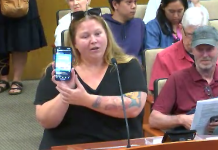By David Burke
What safeguards, if any, have cites including Los Alamitos, Cypress, and La Palma put in place to protect their government against undue influence in the form of campaign contributions from special interests like real estate developers and businesses seeking a city contract? That’s the question we asked of every city in Orange County in Citizens Take Action’s new report card that grades cities on the strength of their campaign finance laws and the transparency of campaign finance data. Unfortunately, in many cities the answer is “none.”
While most people think of federal elections when they think of big money in politics, special interests use campaign contributions and independent expenditures to influence local governments as well. Typically, in city council or mayoral elections it is real estate developers, waste management companies, labor unions, and local businesses that spend heavily to support their chosen candidates. For example, in Anaheim political action committees (“PACs”) for the city’s Chamber of Commerce, Firefighters Association, Police Officers Association, and a group called Support Our Anaheim Resort Area each spent over $25,000 to influence the city’s 2020 election.
These groups aren’t spending such hefty sums as charity. They do it because they expect to be rewarded with favorable treatment by the representatives they helped elect. Voters are smart enough to know that, which may be why polls have shown a correlation between increased campaign spending and diminished trust in government. Whether the issue before a city council is the negotiation of a trash contract or a new development project, residents want to have confidence their representatives are putting the community’s needs over those of large campaign contributors.
Fortunately, even at the municipal level there are things we can do to limit the influence of big money. Enacting strong limits on how much an individual or PAC can contribute to a candidate’s campaign makes it much more difficult for special interests to buy influence. In addition, posting the campaign contributors for every sitting representative on a city’s official website makes it easy for residents to see whose money is behind their elected officials. The presence of such laws and data was the criteria we used to score every city in Orange County across eight different categories and give them a cumulative letter grade.
In the immediate area, Cypress and La Palma received a F while Los Alamitos got a D minus. Each city received a low grade in part because none of the them have enacted their own campaign contribution limits, meaning that the only limit in place is a state-set $4,900 limit for individual contributors. By contrast, Huntington Beach has a campaign contribution limit of $620 on both individuals and PACs. If a city with 200,000 residents can have limits well under $1,000, there is no reason smaller cities should not follow suit. Without such limits, a developer, waste management company, or labor union could potentially contribute $4,900 to every sitting council member the week before the council votes on an agreement with that entity.
Those low grades were also due to a limited amount of campaign finance data available on the city’s official websites. For example, in Cypress the city’s website has posted Fair Political Practices Commission (“FPPC”) Form 460—which shows a candidate’s campaign contributions—for the candidates who ran in the 2020 election, but not for the sitting council members who were elected in 2018.
To be clear, just because a city scored poorly on our report card doesn’t mean the government is corrupt or that elections are dominated by money from special interests. What is does mean, is that the city is vulnerable to both the reality and appearance of quid pro quo corruption, in which large campaign contributors receive favorable treatment from elected officials. And although most cities in Orange County received low grades—nearly half received a F or D minus—some have taken noteworthy steps to minimize that threat.
A dozen cities in Orange County including Seal Beach, Irvine, and Orange have enacted campaign contribution limits on individuals of $1,000 or less, which is one of the reforms we recommend. Three cities—Santa Ana, Laguna Beach, and Yorba Linda have unique limits aimed at developers or prospective city contractors, which reduces the chance of those special interests rewarding a council member with a large campaign contribution after a favorable vote. Cities like Laguna Niguel and Dana Point have also made it very easy for residents to see all the campaign contributions behind every sitting city council member.
For cities with low grades such as Cypress, La Palma, and Los Alamitos, one comprehensive ordinance modeled after those in higher scoring cities like Santa Ana or Huntington Beach could dramatically transform a city’s campaign finance laws. Beyond Orange County, Thousand Oaks and Alhambra have also passed comprehensive reforms that can serve as a model for others.
The bad news is that there are limits to what we can accomplish under current law. Due to poorly reasoned Supreme Court decisions like Citizens United v. FEC, which allowed corporations and unions to spend unlimited amounts of money to influence elections, we cannot place limits on independent expenditures, which is money used to support or oppose a candidate that is not given directly to the candidate’s campaign. Some readers may be surprised to see that Irvine, with a torrent of outside spending in its elections, received a B on our report card while many smaller cities graded lower. But that outside spending is the Supreme Court’s fault, not Irvine’s.
Despite some constraints, there are still many steps we can take to ensure our local elections are not dominated by a few special interests with deep pockets. And if you are among the majority of Americans who want less money in politics, there is nothing standing in the way of contacting your local council members and asking if they will support strong campaign contribution limits and more transparency in your city. If they won’t, maybe it’s time to look for candidates who will.
Editor’s Note: David Burke is an attorney and the founder of Citizens Take Action, a nonprofit organization promoting civic engagement.
Editor’s Note: David Burke is the founder of Citizens Take Action, a nonprofit organization promoting civic engagement. Mr. Burke’s organization prepared this report.












